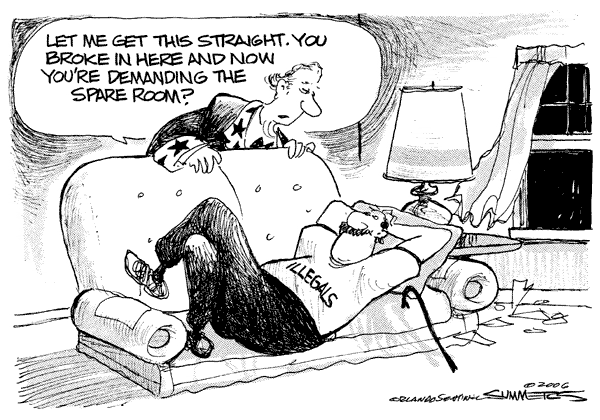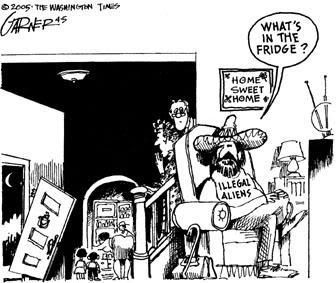

Posted on 08/21/2007 4:27:35 AM PDT by raybbr
While unauthorized entry into the United States is illegal, being in the country after having entered illegally is not necessarily a crime, according to a new ruling by the Kansas Court of Appeals.
In a Barton County case, a three-judge panel issued an opinion Friday that a judge could not deny probation and order jail time for convicted drug dealer Nicholas L. Martinez based solely on the grounds that Martinez is an unauthorized immigrant.
"While Congress has criminalized the illegal entry into this country, it has not made the continued presence of an illegal alien in the United States a crime unless the illegal alien has previously been deported and has again entered this country illegally," Judge Patrick McAnany wrote for the court majority.
Barton County Attorney Douglas Matthews said courts in Oregon and Minnesota have issued similar rulings. But he said, "My research tells me this is the first time this has come up in this state."
Martinez's lawyer, Janine Cox of the Kansas appellate defender's office, declined to comment because prosecutors have not decided whether to appeal the decision to the state Supreme Court.
The case arose from the sentencing of Martinez, who pleaded guilty to felony possession of cocaine and endangering a child by having his young son deliver drugs to an undercover officer, according to court documents.
(Excerpt) Read more at kansas.com ...
I have to agree with the ruling. It seems like a nice ty by the prosecutor or probation office, but one that should fail. The way I read it, they wanted to say he violated probation, but the only thing they could find was that he was still in America after the illegal crossing. His probation must obviously be connected to a crime committed after he crossed illegally, so they're trying to pin a probation violation on him for something he did before he was ever placed on probation. That's not a good can of worms to open, in my opinion. Only the sanctimonious punish-everyone-for-anything-you-can crowd could really support an idea like that.
Now, if the legislatures wanted to make it a crime to stay here and simply breathe, that would be a different story... but I'm not terribly sure that they should. Remember, any time they open a new kind of rule, they expand on it until it becomes nearly universal. Government never contracts its scope of authority.
I've sent this up a bit here.
Robbing the bank is illegal -
however, if you just HAVE the money stolen from the bank, that’s not illegal.


Your point about a home break in is well taken. But allow me to play devil’s advocate for just a moment (no, not the video game). Is a bigamist breaking the law when he lives with his second concurrent wife, or just when he marries her?
Not trying to stir up a hornets nest here!
Thanks for the PING
I think you are missing the point. Where in the above does it say that the guy's mere presence is itself a crime? It says it's illegal to hire an illegal alien. Yes, he committed a crime to get here. Yes, he can be prosecuted for that. But no, his presence in the U.S. isn't a separate crime (according to the appeals court's interpretation of the law).
BUT as I said, that's irrelevant. They aren't enforcing or failing to enforce Federal law. They are ruling on a state drug case and nothing more.
“While unauthorized bank withdrawals are illegal, having the stolen money after a bank robbery is not necessarily a crime, according to a new ruling by the Kansas Court of Appeals.”
Actually, stealing and possession of stolen property are two separate crimes. If possession wasn't made illegal by a specific law it wouldn't be, um, illegal.
You would of course be wrong about that.
Possession is a separate crime to cover fences and others. A bank robber is not absloved of the robbery, and cannot keep the money.
That's right. I'm not sure how that applies here.
The trial court sentenced the guy to jail specifically because "being here" is illegal. Well "being here" isn't a crime. That's what the appeals court is saying. The trial court should have sentenced him to jail because he committed the crime of illegal entry. Or "just because". By citing a specific and invalid reason, the trial court screwed up.
I think we’re seeing the results of a public schooling.
Let’s see, it’s illegal to enter an area, but “being in” the area isn’t illegal,
but somehow, being in the area can’t directly be used as evidence to the act of entering illegally?
This would be called “non-linear thinking”.
The act of trespassing is a crime, but remaining on the premises forever there after is not a crime?
TSK! TSK! TSK!
From a legal standpoint you are simply wrong.
Congress made it illegal to make unsanctioned entry into the country (8 U.S.C. §1325).
Congress made it illegal to be in the country after being deported for entering illegally (8 U.S.C. §1326).
If Congress had wanted to, it could have made presence in the country a crime after illegal entry. Instead, it only made it a crime if you have once been deported. Your interpretation of the law (that I'm quite sure you haven't read) would make 8 U.S.C. §1326 superfluous. As I'm sure you know, laws are to be read so as to not conflict with each other or make each other nonsensical or meaningless.
I never said that. In addition, he isn't being charged with entering illegally. If he was, then OF COURSE "being here" is evidence of illegal entry.
Alas, true.
None of that contradicts what the court said. It’s a crime to assist illegal aliens to stay here, but the act of being here is not a crime in and of itself. Quite a loophole which Congress should rectify in the next session.
I think these guys haven't read the opinion or the laws that apply in this case. Perhaps they can go read the opinion before making silly arguments.
So robbing a bank is illegal, but spending the money is OK? Is that how this logic works?
Disclaimer: Opinions posted on Free Republic are those of the individual posters and do not necessarily represent the opinion of Free Republic or its management. All materials posted herein are protected by copyright law and the exemption for fair use of copyrighted works.